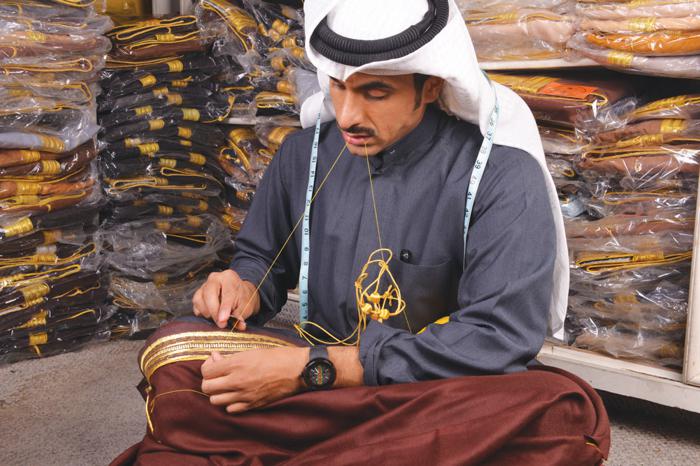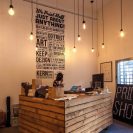There is something timeless and beautiful about the small company, handed down from father to son in an effort to keep the tradition going; perhaps even more so, when this pattern repeats over several generations via handcrafted bespoke products of traditional heritage. Abdul Mohsen Al-Sulaiman, a 30-ish year old self-described hardcore athlete, has as much passion for sports and running as he does for the traditional garments that he makes in the same shop as his father did before him. With a family name that has been synonymous with the Bisht—a cloak-like garment often worn for more formal events regionally—and Bisht-making since far before anyone he knows can recall (especially with nobles, diplomats, and sheikhs from the ruling family throughout Kuwait and the larger Gulf Region) he spent most of his early years learning this family trade. After returning from studying business in Egypt, he was poised to take over the family shop when it became time. He now happily services many of the same customers and families that utilized his family’s bisht-making talents for generations, at the store Al-Sulaiman Bisht Al-Wajaha.
Tell us about the history behind the company?
The company is more than 100 years old, my great-grandparents handed down the business to my father, who in turn handed it down to me. Throughout the years we have each worked to make sure to provide only the best fabrics and textiles available, along with the best handmade quality embroidery. The Bisht business is not an easy one as it represents a combination of culture and history, as well as art and tradition. The many details and different origins of design can be intimidating. So, it’s quite a big world to dive into, yet at the same time, for me it is interesting and appealing.
What is the inspiration behind the name of the company and what does it mean?
The Name “Alwajaha” means “Prestige” and royalty, it reflects the essence of the Bisht, since it is made of what are considered to be luxury fabrics, and was historically worn by Sheikhs, Amirs, and royalty in general. Also, some Bishts are worn in specific special events, such as marriage and official ceremonies.
How long have you been running the company and have you made any changes?
I have been running it now for the past 3 years. We have made some changes when it comes to presenting new designs to the embroidery of the men’s Bisht specifically, and added private tailoring. We also have introduced the women’s Bisht to our line of products, which have been in fashion now for some time. We have different qualities and colors for different seasons too. We also do specialty embroidering of names or GCC country flags on to the Bisht.
Tell us about the Bisht specifically, both in a historical and modern context?
First, the word Bisht goes back to a Farsi word “Posht,” which means a cover for men or women, and goes back thousands of years. Originally worn daily, though over time more for special occasions. With time they started adding embroidery and different fabrics and colors, divided primarily into winter and summer design elements.
How long does it take to make one?
It depends on the quality and embroidery, but on average, it is anywhere from 10 days to 2 weeks.
What is the process of making one?
First, we choose the fabric and cut it in accordance to the person’s height. Then we choose the inner fabric for the Bisht, we start the embroidery work which includes brooj, tarcheeb, samd, alhaila, and then, almaksar and finally, alqaitan. Each step has a specific person designated for it. The tools used usually are: scissors, chalk, needle, threads, and wax.
Is one more special than another?
Of course, the fabric in a “doraqy” bisht is different than “alnajafy,” yet they are the most expensive, because the textile is made by hand it’s made of either camel, goat or sheep threads. Also, when it comes to the embroidery, there are different grades of threads, some of which we have imported from France.
Where do you sell them?
They are sold exclusively at our store in Mubarakiya, though we have recently added international shipping to our services due to high demand.
What would you like to see happen for your company in the future?
Expansion to other GCC countries is definitely in our plans for the near future. On the other hand, I would like the legacy of our ancestors to continue, by which I mean that I would like to see the younger generation appreciate the Bisht as much as previous generations have, and continue wearing it. Specifically, sometimes the youth seem to confuse being cool with being modern, and not wearing traditional clothes, but being loyal to our local traditions can be very cool too!
For more information on how to get your custom Bisht, follow them on Instagram @Abdulmohsen_al or visit their shop: Almubarakiya souq (behind door 3).











